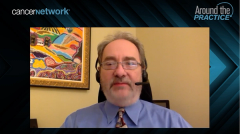
The Role of Belantamab Mafodotin and Its Impact on Future Treatment Options
Expert oncologists discuss Belantamab mafodotin, its recent withdrawal from the U.S. market, and the clinical implications of the DREAMM trials for patients with R/R multiple myeloma.
Episodes in this series

Transcript:
Robert Z. Orlowski, MD: Tell us a bit about, Amrita, what do you think about belantamab [mafodotin], since before the ASH [American Society of Hematology] meeting, the announcement was made that because of a negative phase 3 study, that’s going to be taken off of the market, at least for routine use. Do you think it’ll come back? Does it have a chance?
Amrita Krishnan, MD: Many of us believe the challenges with belantamab related more to dose and schedule, and we still felt it was an effective drug for a select group of patients. That trial, there was a decent PFS [progression-free survival] in the belantamab arm, it just didn’t meet the statistical significance needed for that study. The drug is valid, and so I do hope it manages to keep itself afloat and resurrect. Again, [the challenge will be] figuring out where to use it and how to use it. Most people weren’t using it in that dose and schedule that were used in the DREAMM-2 study.
C. Ola Landgren, MD: There are also combinations in development with lenalidomide, and also with pomalidomide, and those trials are ongoing. There is also the possibility that those trials could read out favorably, and they could come back to ODAC [Oncologic Drugs Advisory Committee], and the drug could be again approved in combination. That’s also something I think is quite likely, that could be the case with the drug.
Ajay K. Nooka, MD: I’d like to add to that because this drug was not pulled because of any safety issues, I want that for clarity. The reason it was approved was, and it was conditional approval, so conditional approval was made based on the response rate and with a small contingency that you have to prove that efficacy in a phase 3 trial. If the phase 3 trial didn’t meet its primary end point, it doesn’t mean in any way that the drug is not effective.
C. Ola Landgren, MD: What’s interesting, looking at the data and the details, the devil is always in the details, as we discussed here before, the curve for the belantamab arm dipped fast, and then it was plateauing out. There is something that happened in the beginning for certain patients, and that impacted results. There was a lot of investigation trying to understand was there something going on, was there a particular region in the world, or some center, some patients, some therapies, something to try to understand the data. I’m sure there’s going to be a lot of investigation of the details of the failure of the phase 3 trial.
Robert Z. Orlowski, MD: It’s also important to note that for patients who are still on belantamab and benefiting, they can continue, and if you have patients you think could benefit, it is still available on an expanded access basis.
Transcript edited for clarity.
Newsletter
Stay up to date on recent advances in the multidisciplinary approach to cancer.










































